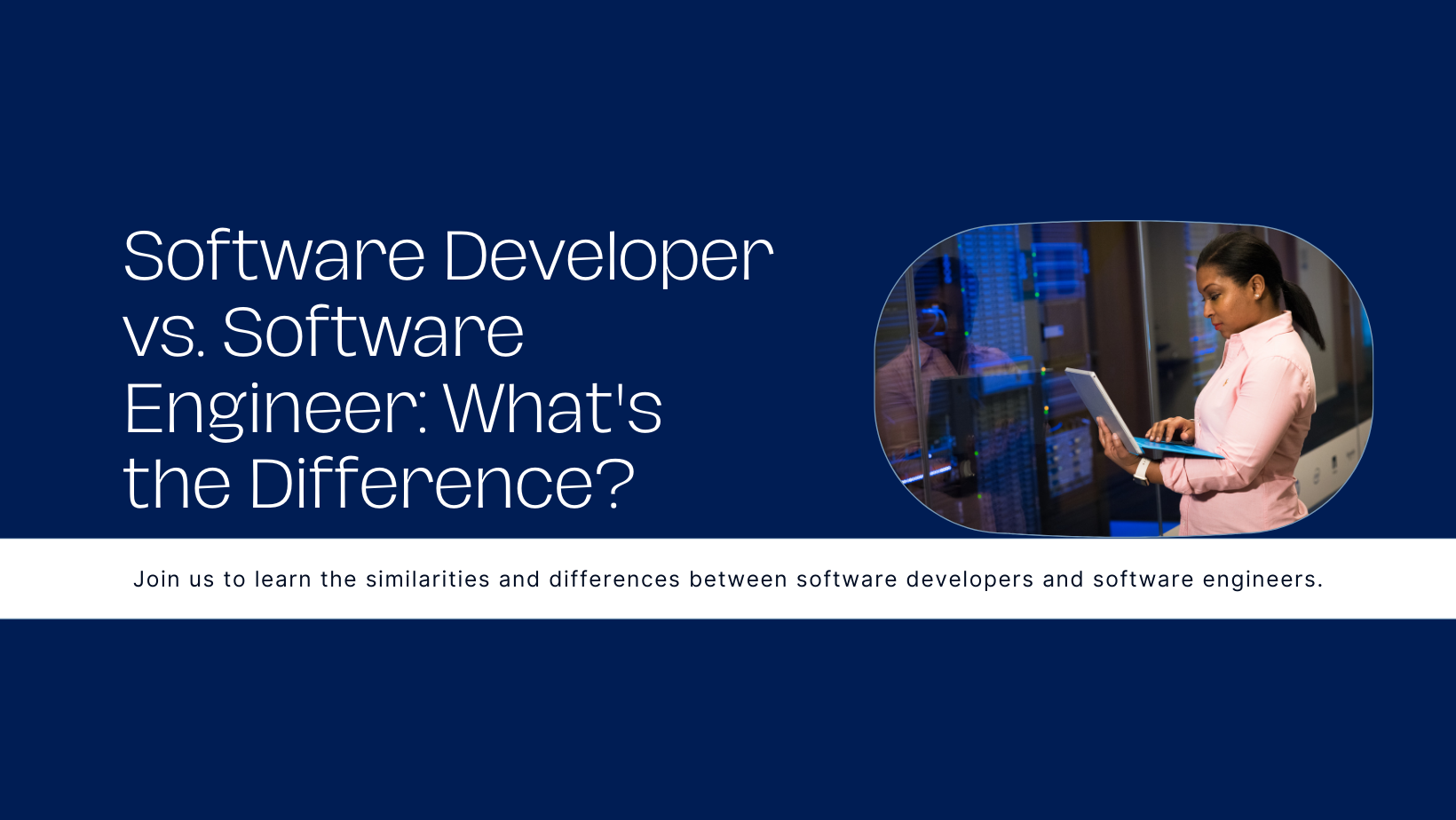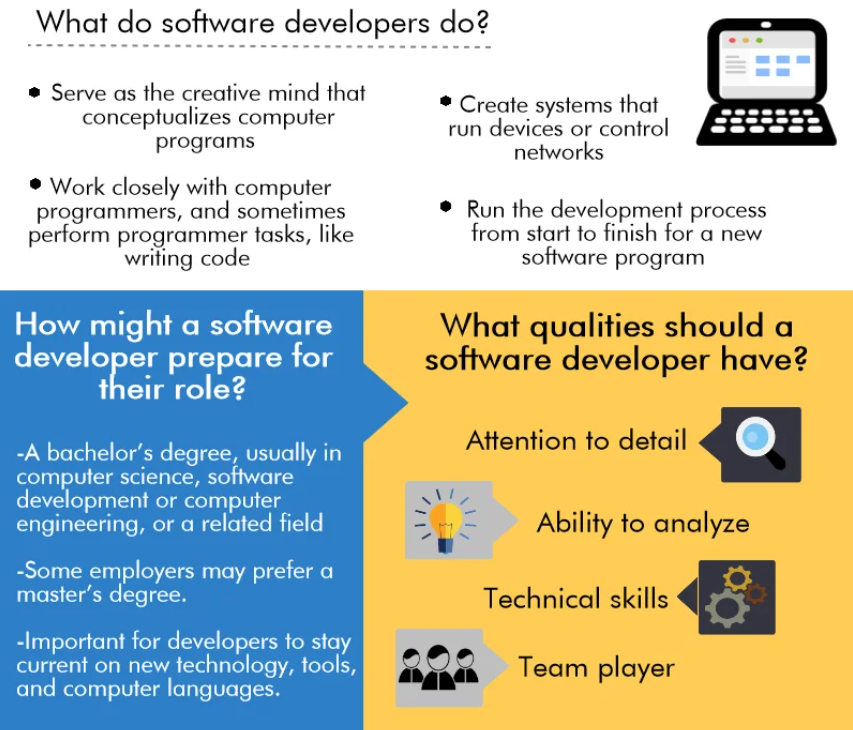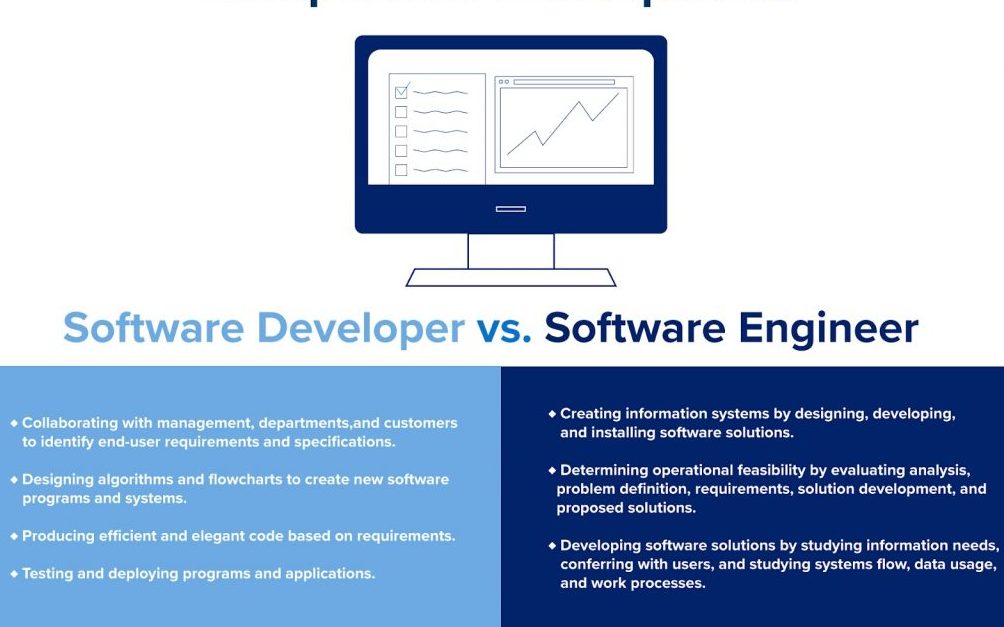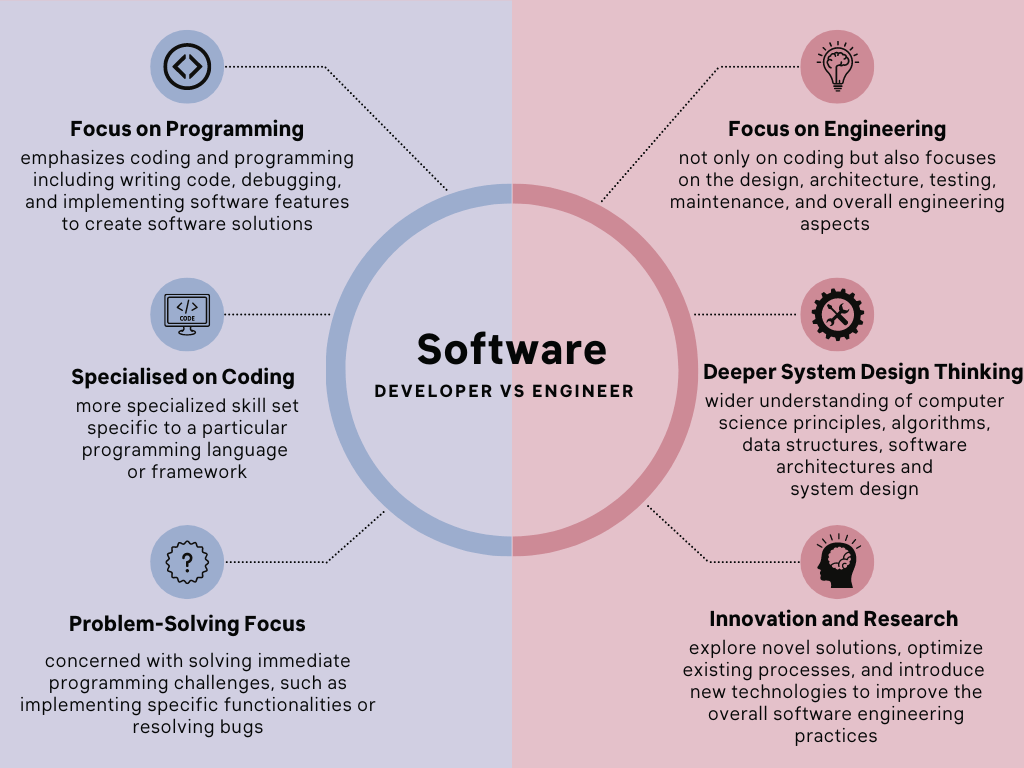In today’s competitive job market, internships are no longer just an extra activity; they have become a must-have for anyone looking to build a successful career. For college students and…

Software Developer vs. Software Engineer: Skills, Difference, Similarities
The world of technology is brimming with exciting career opportunities, and software development is at the forefront of this revolution. But within this vast domain, two titles often confuse software developer and software engineer. While both roles play a crucial part in bringing software applications to life, they possess distinct nuances.
This comprehensive guide dives deep into the world of software development, exploring the specific duties, skillsets, and career paths of both software developers and software engineers.
Table of Content
- Who is a Software Developer?
- Software Developer Educational Requirements
- Who is a Software Engineer?
- Software Engineer Educational Requirements
- Differences Between Software Developers and Software Engineers
- Similarities Between a Software Developer and a Software Engineer
- FAQs on Software Developer vs. Software Engineer
Who is a Software Developer?
A software developer is a skilled professional who specializes in writing code to create functional software applications. They act as the builders, transforming designs and requirements into working software. Software development engineers typically focus on specific aspects of a project, such as developing features, integrating APIs, or implementing user interfaces.

Key Responsibilities of a Software Developer:
- Translate software requirements into clean, efficient, and maintainable code.
- Develop, test, debug, and deploy software applications.
- Collaborate with designers, software engineers, and testers to ensure project success.
- Stay up-to-date with the latest programming languages, frameworks, and development tools.
- Write clear and concise code documentation for future reference.
Skills for Software Developers:
- Programming Languages (e.g., Python, Java, JavaScript)
- Software Development Tools (e.g., IDEs, Version Control Systems)
- Application Programming Interfaces (APIs)
- Software Design Principles
- Testing and Debugging Techniques
- Problem-solving and Analytical Skills
Software Developer Educational Requirements
There are a few different education paths students in India can take to become software developers.
Formal Education
The most common route is to pursue a formal education in computer science or a related field. Here’s a breakdown of the educational qualifications:
- Bachelor’s Degree: This is the most sought-after qualification by employers. Popular options include a Bachelor of Technology (B.Tech) in Computer Science or Information Technology, or a Bachelor of Computer Applications (BCA). These programs typically last for four years and cover a wide range of software development topics, including programming languages, data structures, algorithms, software engineering principles, and web development.
- Master’s Degree: A master’s degree in computer science or a related field can give students a competitive edge in the job market. Master’s programs typically last for two years and provide students with an opportunity to specialize in a particular area of software development, such as artificial intelligence, machine learning, or cybersecurity.
- Diploma and Certificate Courses: For those who are looking for quicker entry into the workforce, there are also diploma and certificate courses available in software development. These programs typically last for one to two years and focus on teaching students the practical skills they need to get a job as a software developer.
Non-Formal Education
There are also many resources available for students who want to learn software development outside of a formal education setting. These resources include online courses, coding boot camps, and hackathons.
- Online Courses: Several websites offer online courses in software development. These courses can be a great way for students to learn at their own pace and from the comfort of their own homes.
- Coding Bootcamps: Coding bootcamps are intensive programs that can teach students the skills they need to become software developers in a short period. Bootcamps typically last for a few months and can be a great option for students who are looking to change careers or who want to learn the latest technologies.
- Hackathons: Hackathons are events where teams of programmers come together to build software applications over a short time. Hackathons can be a great way for students to learn new skills, network with other developers, and build a portfolio of their work.
Important Considerations
- Specialization: The field of software development is vast and there are many different specializations that students can choose from. Some popular specializations include front-end development, back-end development, full-stack development, mobile development, and data science.
- Skills: In addition to a formal education, it is also important for software developers to have strong problem-solving skills, analytical skills, and communication skills. They should also be up-to-date on the latest technologies and trends in the software development industry.

Who is a Software Engineer?
A software engineer, on the other hand, adopts a more holistic approach. They are the architects, responsible for designing, developing, and implementing complex software systems. Software engineers possess a broader skillset that encompasses not only coding but also system design, software architecture, and an understanding of software development methodologies.
Key Responsibilities of a Software Engineer:
- Design and develop software systems with scalability, security, and performance in mind.
- Create and maintain software architecture diagrams and documentation.
- Choose appropriate development tools and technologies for a project.
- Analyze system requirements and translate them into technical specifications.
- Oversee the development process, ensuring adherence to deadlines and quality standards.
- Collaborate with stakeholders, including developers, testers, and clients.
Skills for Software Engineers:
- Software Design Patterns and Architecture
- Algorithms and Data Structures
- System Design and Analysis
- Software Development Methodologies (e.g., Agile, Waterfall)
- Database Management Systems
- Strong Collaboration and Communication Skills
- All of the skills mentioned for Software Developers
Software Engineer Educational Requirements
Indian students have a couple of main paths to becoming software engineers:
Formal Education
The most common route is to pursue a formal education in computer science or a related field. Here’s a breakdown of the educational qualifications:
- Bachelor’s Degree: This is the most desired option by employers. Popular choices are a Bachelor of Technology (B.Tech) in Computer Science or Information Technology and a Bachelor of Computer Applications (BCA). These typically last 4 years and cover various software development aspects like programming languages, algorithms, software engineering principles, and web development.
- Master’s Degree: A Master’s in Computer Science provides a competitive edge. These programs typically last 2 years and allow specialization in areas like Artificial Intelligence or Cybersecurity.
Non-Formal Education
There are also many resources available for students who want to learn software engineering outside of a formal education setting. These resources include
- Online Courses: Various online platforms offer online software development courses allowing students to learn at their own pace.
- Coding Bootcamps: These intensive programs teach software development skills in a short period (a few months). They’re ideal for career changers or those wanting to learn the latest technologies.
Important Considerations
- Specialization: Software development offers various specializations like front-end development, back-end development, or mobile development. Choose an area that interests you.
- Skills: Problem-solving, analytical thinking, and communication skills are crucial for software engineers. Staying updated on the latest technologies is also important.
Differences Between Software Developers and Software Engineers
While there is some overlap in responsibilities, some key distinctions differentiate software developers from software engineers:

- Focus: Software developers focus on writing code for specific features or functionalities within a project. Software engineers, on the other hand, have a broader focus, encompassing the entire software system’s design, development, and implementation.
- Skillset: Software developers possess strong coding skills and proficiency in development tools. Software engineers require a deeper understanding of software design principles, algorithms, and system architecture in addition to coding expertise.
- Experience: Entry-level software developer positions may require less experience compared to software engineer roles, which often demand a proven track record in designing and building complex software systems.
Similarities Between a Software Developer and a Software Engineer
Despite their differences, software developers and software engineers share some core competencies:
- Problem-Solving Skills: Both roles require an adeptness at identifying, analyzing, and resolving technical challenges.
- Analytical Thinking: Both developers and engineers must be able to break down complex problems into smaller, manageable steps.
- Communication Skills: Effective communication with colleagues, clients, and stakeholders is vital for both roles.
- Passion for Technology: A love for learning and staying updated with the ever-evolving technological landscape is crucial for success in both fields.
Here’s an analogy to understand the difference: Imagine building a house. A software developer would be like a skilled carpenter who builds walls, doors, and windows based on blueprints. A software engineer would be the architect who designs the entire house layout, ensures structural integrity, and oversees the construction process.
The choice between becoming a software developer or a software engineer depends on your strengths and interests. If you enjoy meticulously crafting code and relish the challenge of bringing features to life, then software development might be your calling. If you have a broader vision, are passionate about designing complex systems, and possess a strong understanding of computer science fundamentals, then software engineering could be the ideal fit.
Regardless of the path you choose, both software developers and software engineers play a significant role in shaping the technological landscape.
Related Reads:
- Career Options After Engineering
- Top Emerging Fields in Engineering
- Emerging Careers In India For Freshers
FAQs on Software Developer vs. Software Engineer
Which pays more, software developer or software engineer?
On average, software engineers tend to earn higher salaries due to their broader skillset and leadership roles. However, experienced software developers with specialized skills can also command high salaries.
Is a software developer a good career?
Yes, software development is a highly sought-after career with excellent job growth prospects and competitive salaries.
Do I need a degree to become a software developer?
While a computer science degree can be beneficial, it’s not always mandatory. Strong programming skills, a relevant portfolio, and boot camp certifications can also open doors.
What’s the difference between software development and software engineering?
Software development focuses on writing code for specific functionalities, while software engineering involves designing, developing, and implementing entire software systems.
Is software engineering harder than software development?
Software engineering often requires a deeper understanding of computer science fundamentals and broader technical knowledge compared to software development.
Can a software developer become a software engineer?
Absolutely! With additional learning and experience in software design and architecture, developers can transition into software engineering roles.
What are the best programming languages for software development?
Popular choices include Python, Java, JavaScript, C++, and C#. The best language depends on the specific project requirements.
What are some essential tools for software developers?
Integrated Development Environments (IDEs), version control systems (like Git), and testing frameworks are crucial tools for developers.
What soft skills are important for software developers and engineers?
Problem-solving, analytical thinking, communication, teamwork, and a passion for learning are essential soft skills for both roles.
Is there a future for software development and engineering?
The demand for software professionals is expected to continue surging as technology integrates further into our lives.
Latest Posts
Python vs JavaScript: Which Language Should You Learn First?
Choosing the right programming language can shape your career in today’s competitive tech world. Two of the most popular languages among beginners and professionals are Python and JavaScript. If you’re…
AI Trends Transforming Tech and Businesses in 2025!
Artificial Intelligence (AI) is no longer just a futuristic concept, it’s shaping how we live, work, and think. For college students and freshers in India aspiring to build a career…
Software Development Engineer [SDE] – Full Form, How to Become
Software Development Engineers (SDEs) are the backbone of the technology industry, responsible for crafting innovative software solutions that power our digital world. In this extensive guide, we will delve into…
How to Write a Perfect Career Objective for a Freshers’ Resume
A career objective is a concise statement that summarizes your professional objectives. It usually appears at the top of your resume and can help companies figure out what you’re looking…
Popular Posts
Top 21 Highest Paying Jobs in India For Freshers
The Indian job market is evolving rapidly, with new opportunities emerging across various sectors. As a student or fresher, identifying the best career in India that aligns with your interests…
25+ Best Online Courses for Graduates in 2025 [Free & Certified]
In today’s competitive job market, earning a degree is just the beginning. To truly stand out, college students and freshers must constantly upskill, stay updated with industry trends, and gain…
Best CV Formats for Freshers: Simple, Professional & Job-Winning Templates
Creating an effective CV (Curriculum Vitae) is the first step towards landing your dream job or internship as a fresh graduate. Your CV is your initial introduction to potential employers…
Top Computer Science Jobs for Freshers in India
The rapid evolution of technology has created immense opportunities for fresh computer science graduates. With the IT sector expanding globally, India is one of the top countries offering lucrative and…
How to Answer – ‘What Are Your Strengths and Weaknesses?’
Landing your first job is a thrilling yet daunting experience. You’ve meticulously crafted your resume, researched the company, and prepped for potential questions. But there’s one question that throws even…


